It seems David Cameron is prepared to renege on his election promise to put all changes to EU treaties to a referendum in the UK.
In a speech to the House of Commons following his first meeting of the European Council, made up of the prime ministers and presidents of the 27 EU Member States, Mr Cameron was full of bravado about not letting any agreement ‘alter member state competences’ . However, despite quoting Margaret Thatcher, in reality Cameron is supporting Germany’s desire to make changes to the Lisbon Treaty in the wake of the financial crisis and the problems caused by the situation in Greece. If these treaty changes are to go forward, where, Mr Cameron, is your treasured referendum?
David Cameron also supported the EU 2020 Strategy and Millennium Development Goals in his speech to MPs. I found this a little strange since, as Harriet Harman rightly pointed out in her response, Conservative MEPs have either abstained or voted against these measures in the European Parliament. Cameron didn’t even have a response, deciding instead, rather pathetically, to say that he would be keeping an eye on the Labour and Lib Dem MEPs. I wonder what the Tories’ coalition partners made of this.
Following George Osborne’s deeply damaging budget, David Cameron’s antics in Europe add depth and context to the picture of the Coalition Government which is beginning to emerge, an image of a Conservative Party that really does not know what it is doing over some of the most important issues currently facing us.
Part of me almost feels sorry for David Cameron. He must have been a lonely figure in Brussels last week. Seeing the leaders of centre right parties from across Europe meeting before the European Council summit in order to discuss strategy, whilst he was left to ‘strategise’ with one far right Polish MEP. That is price you pay for isolating yourself from the biggest political grouping in European politics (the European Peoples’ Party) and allying yourself with the far-right, eurosceptic fringe. Sarkozy and Merkel gave an impressive press conference afterwards, detailing the decsions reached in the summit. Not too long ago, the British Prime Minister would have been standing right beside them. Not now.
There was a telling moment in the debate in the House of Commons where one of Cameron’s own MPs (William Cash) asked a question regarding the “30 European directives in the pipeline which will deeply affect our financial regulation and economic governance” and questioned how we might regain and retain control over economic issues. David Cameron could only rather weakly respond that the European Parliament had made things ‘a lot more burdensome’ and that it was ‘not a satisfactory situation’. Now I happen to think that these financial regulations are necessary, but perhaps Cameron’s political position would be a good deal more ‘satisfactory’ if they could actually engage and influence European politics. Cameron needs to realise that euroscepticism may win him the support of the back benches, but in Europe he’ll be left standing on the sidelines with the nutters, looking lonely and confused.








